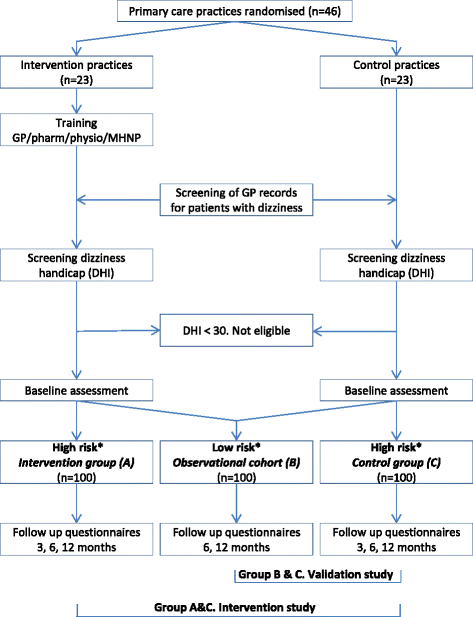Impairment reduction in older dizzy people in primary care: study protocol for a cluster randomised controlled trial
- PMID: 26209097
- PMCID: PMC4514942
- DOI: 10.1186/s13063-015-0848-1
Impairment reduction in older dizzy people in primary care: study protocol for a cluster randomised controlled trial
Abstract
Background: The management of dizziness in older patients is primarily diagnosis-oriented. However, in 40% of older patients with dizziness, GPs are not able to identify an underlying cause, and a number of common underlying causes of dizziness cannot (or hardly) be treated. In this study we will investigate the effectiveness of a prognosis-oriented approach in the management of dizziness in older patients. This prognosis-oriented approach comprises identification of patients at risk for chronic dizziness with persistent impairment by identifying risk factors for an unfavourable course of dizziness. Patients at risk for chronic dizziness with persistent impairment will be offered treatment addressing the identified modifiable risk factors.
Methods/design: This study will be performed in primary care. An intervention study and a validation study will be conducted in a three-arm cluster randomised design. In the intervention study we will investigate a risk factor guided multi-component intervention. The risk factor guided intervention includes: (1) medication adjustment in case of three or more prescribed fall-risk-increasing drugs, (2) stepped care in case of anxiety disorder and/or depression, and (3) exercise therapy in case of impaired functional mobility. The primary outcome measure is dizziness-related impairment, which will be assessed with the Dizziness Handicap Inventory. Secondary outcome measures are quality of life, anxiety disorder and depression, use of fall-risk-increasing drugs, dizziness frequency, fall frequency, and healthcare utilization.
Discussion: This study is, to date, the first study that will investigate the effectiveness of a prognosis-oriented approach for reducing dizziness-related impairment in older people in primary care. Offering treatment that addresses identified modifiable risk factors to patients at high risk for chronic dizziness is unique. The pragmatic design of this study will enable evaluation of the outcomes in real-life routine practice conditions. An effective intervention will not only reduce dizziness-related impairment, but may also decrease healthcare utilization and healthcare costs. The previously developed risk score that will be validated alongside the intervention study will enable GPs to identify patients at high risk for chronic dizziness with persistent impairment.
Trial registration: Netherlands Trial Register (identifier: NTR4346), registration date 15 December 2013.
Figures
Similar articles
-
Effectiveness of a multifactorial intervention for dizziness in older people in primary care: A cluster randomised controlled trial.PLoS One. 2018 Oct 9;13(10):e0204876. doi: 10.1371/journal.pone.0204876. eCollection 2018. PLoS One. 2018. PMID: 30300371 Free PMC article. Clinical Trial.
-
Reducing the burden of dizziness in middle-aged and older people: A multifactorial, tailored, single-blind randomized controlled trial.PLoS Med. 2018 Jul 24;15(7):e1002620. doi: 10.1371/journal.pmed.1002620. eCollection 2018 Jul. PLoS Med. 2018. PMID: 30040818 Free PMC article. Clinical Trial.
-
Tailored multifactorial intervention to improve dizziness symptoms and quality of life, balance and gait in dizziness sufferers aged over 50 years: protocol for a randomised controlled trial.BMC Geriatr. 2017 Feb 15;17(1):56. doi: 10.1186/s12877-017-0450-3. BMC Geriatr. 2017. PMID: 28202037 Free PMC article. Clinical Trial.
-
The impact of dizziness on quality-of-life in the elderly.Eur Arch Otorhinolaryngol. 2017 Mar;274(3):1245-1250. doi: 10.1007/s00405-016-4222-z. Epub 2016 Jul 22. Eur Arch Otorhinolaryngol. 2017. PMID: 27450383 Review.
-
Vertigo and Dizziness: Understanding and Managing Fall Risk.Otolaryngol Clin North Am. 2018 Aug;51(4):725-740. doi: 10.1016/j.otc.2018.03.003. Epub 2018 May 24. Otolaryngol Clin North Am. 2018. PMID: 29803531 Review.
Cited by
-
Therapeutic patient education and exercise therapy in patients with cervicogenic dizziness: a prospective case series clinical study.J Exerc Rehabil. 2016 Jun 30;12(3):216-25. doi: 10.12965/jer.1632564.282. eCollection 2016 Jun. J Exerc Rehabil. 2016. PMID: 27419118 Free PMC article.
-
Effectiveness of a multifactorial intervention for dizziness in older people in primary care: A cluster randomised controlled trial.PLoS One. 2018 Oct 9;13(10):e0204876. doi: 10.1371/journal.pone.0204876. eCollection 2018. PLoS One. 2018. PMID: 30300371 Free PMC article. Clinical Trial.
-
Dizziness in older people: at risk of shared therapeutic nihilism between patient and physician. A qualitative study.BMC Fam Pract. 2016 Jul 16;17:74. doi: 10.1186/s12875-016-0474-3. BMC Fam Pract. 2016. PMID: 27421651 Free PMC article.
-
Predicting an Unfavorable Course of Dizziness in Older Patients.Ann Fam Med. 2018 Sep;16(5):428-435. doi: 10.1370/afm.2289. Ann Fam Med. 2018. PMID: 30201639 Free PMC article.
-
Statistical design and analysis in trials of proportionate interventions: a systematic review.Trials. 2019 Feb 28;20(1):151. doi: 10.1186/s13063-019-3206-x. Trials. 2019. PMID: 30819224 Free PMC article.
References
Publication types
MeSH terms
Associated data
LinkOut - more resources
Full Text Sources
Other Literature Sources
Medical


